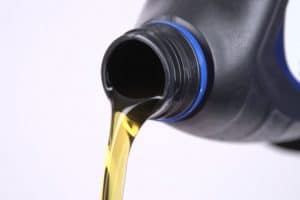
Few instances of this are as true as for motor oil which is fundamentally necessary for your engine to work at all. When you consider the kind of conditions and damage it may have sustained over time, it only makes sense to look for a motor oil made specifically for high mileage engines.
Our List of Best High Mileage Oils
That is why we have prepared a list of the 5 best high mileage oils we could find. A helpful comparison chart and buyer’s guide can give you a good reference, but we rate the Valvoline High Mileage with MaxLife Technology as our Editor’s Choice.
| Model | Type | Viscosity | Additives | |
|---|---|---|---|---|
| Valvoline (Editor’s Choice) | Synthetic Blend | 5w30 | Cleaners and Preservers | Check Price |
| Pennzoil | Conventional | 10w30 | Cleaners and Preservers | Check Price |
| Castrol | Full Synthetic | 10w30 | Preservers and Performers | Check Price |
| Mobil | Full Synthetic | 5w20 | Preservers and Performers | Check Price |
| AmazonBasics | Full Synthetic | 5w30 | Cleaners and Preservers | Check Price |
1. Valvoline 5w30 – Editor’s Choice Best Synthetic Blend High Mileage Oil
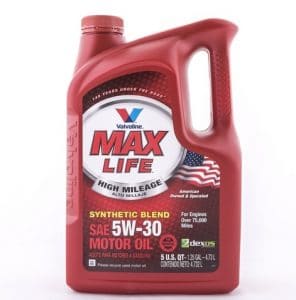
Best Bang
Most people will not require a motor oil that caters to a particular niche–outside of the high mileage market. Instead, the best motor oil is often the one that will prolong the lifespan of your engine without causing too big a dent in your wallet. Thankfully, Valvoline has you covered on both fronts with an oil that significantly extends the life of your vehicle while also coming in as the least expensive that we reviewed. It is worth noting that the Valvoline High Mileage Max Life blend in particular is designed to work with engines that have up to 300k miles on them–assuming you already started using the Valvoline High Mileage blend no later than 150k miles.
All the Additives
A number of motor oils we saw had different focuses of additives depending on what problem they were actually trying to solve. In this instance, the Valvoline decided to favor longevity over high performance, and most of the additives serve that purpose. The detergents and dispersants do an excellent job cleaning the engine, while the antiwear agents and rust-inhibitors make sure that the engine stays in good, working order. Antioxidants have also been added to help the Valvoline oil maintain proper viscosity even under hotter working temperatures.
- Can last for 300k miles
- Has antioxidants
- Has detergents
- Has rust inhibitors
- Has antiwear agents
- Has dispersants
- The least expensive oil reviewed
- Poor container
- Not Dexos compatible
2. Pennzoil 10w30 – Best Conventional High Mileage Oil
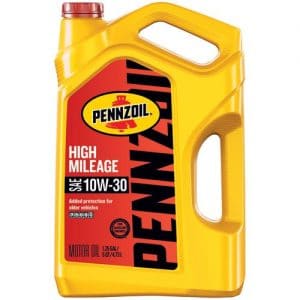
Old School
One of the biggest differences between this high mileage oil and others is that it is made of a conventional formula. This means that the Pennzoil 10w30 is the only product we reviewed that is made of 100-percent petroleum-grade materials. This is actually a great quality for many older engines that are not designed to handle the synthetic oils that are increasingly popular. Even better, older engines are also often designed around a narrower range of specifications, and the Pennzoil takes that into consideration as well.
Conventionally the Best
Beyond the fact that being a conventional motor oil makes this the best choice for certain older engines, the Pennzoil is also a solid oil anyway. One of it’s best qualities is how well it cleans the engine–especially with the first oil change. Even better, the Pennzoil then reinforces the metal of the engine after it has been cleaned. That said, the primary additive and benefits gained from the Pennzoil come as a direct result of its particular cleaning properties which separates sludge into constituent bits. It is also worth noting that just because it is a conventional motor oil does not mean it cannot be used for newer engines as well. This is especially true due to its mixability with both full synthetic and synthetic blended oils. One thing to keep in mind is that this oil only meets API SN standards.
- Has dispersants
- Has detergents
- Has antiwear agents
- Is a conventional oil
- Has 10w30 viscosity
- Compatible with older engines
- Not API SN Plus
- Is a more expensive oil
3. Castrol 10w30 – Best Synthetic High Mileage Oil
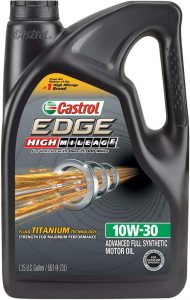
A Big Tent
Considering that the company has been around for over a century, Castrol has a tendency to seek the largest customer base. This means that their products are not always as well suited to niche needs, like an especially older engine. One of the biggest tells of this broad approach involves the viscosity-index rating of the Castrol. While additives will often alter the true viscosity, and the Castrol oil has many of these, the 10w30 viscosity-index is one of the primary standard motor oil viscosities. In fact, the use of a full synthetic formula also contributes to this push towards the bigger market and modern cars.
Unique Additives
The selection of additives used for the Castrol oil is definitely a bit odd for most people’s purposes. Whereas most consumer-grade motor oils are designed to extend the lifespan of the engine itself, Castrol is more a performance oil. While it is certainly not to the level of supercar-worthy, the additives included have a tendency to increase the Castrol’s viscosity. On top of that, this motor oil is also made to function as effectively in colder or warmer temperatures as well. It is worth noting that this is not the best motor oil to use if you are trying to flush out old sludge. Still, it is great for older engines that have been well cared for and are still in good condition.
- Has titanium friction modifiers
- Has viscosity-index improvers
- Is a full synthetic oil
- Has pour-point depressants
- Has 10w30 viscosity
- Has dispersants
- Not the best for cleaning
- Will sometimes burn
4. Mobil 1 5w20 – Best Cold Weather High Mileage Oil
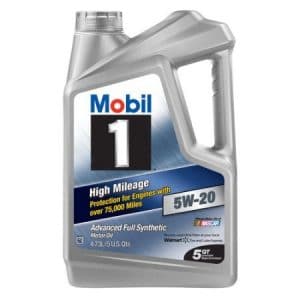
Top of the Class
When it comes to doing its primary job of lubricating your engine, there is no other oil on our list better than the Mobil 1 5w20. Keep in mind, older engines might have additional needs beyond superior lubrication, but it certainly never hurts to have the best performing high mileage oil in your car. In terms of the raw numbers, the Mobil1 has the highest viscosity-index that we reviewed. It also has the lowest pour-point, which means that you do not have to worry about it in cold weather. In fact, along with other qualities, this is the best cold weather high mileage oil we found.
Best of the Bunch
While we will get into the specific additives in one moment, it needs to be stated in bold that the Mobil1 oil has a 15,000 mile lifespan. Granted, that estimate is given for the best of conditions, and you will likely drive through less than ideal conditions yourself. Still, a regular estimate given by customers hovers around the 10k mile mark. Beyond the superior synthetic formula, the Mobil1 also has antioxidants, detergents, antiwear agents, and rust inhibitors. That said, this is not the oil you use to flush out an older, sludgy engine.
- Has the highest viscosity-index reviewed
- Has the lowest pour-point reviewed
- Is a full synthetic oil
- Has 5w20 viscosity
- Has a 15k mi lifespan
- Has numerous additives
- A more expensive oil
- Not the best cleaner
5. AmazonBasics 5w30 – Best New Engine High Mileage Oil
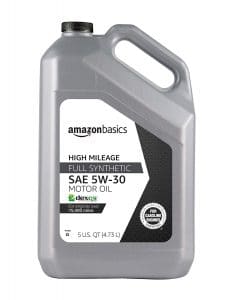
Never Too Early
One thing to keep in mind is that while this motor oil was made for high mileage engines, that does not necessarily mean it was made for older-model engines. Specifically, this is one of the few motor oils we saw that is rated SN Plus, GF-5, and Dexos Gen-2. Basically, if you have a newer model combustion engine, chances are this motor oil will work for it. This oil may not actually be compatible with many engines, especially if they were made before 1993. Still, if you have a newer engine, this motor oil is a solid choice but especially if it has a lot of miles on it.
Solid Additives
Since the AmazonBasics seems to be designed for newer model engines, it does make sense that the current formula does not favor detergents or dispersants. Without the decades of sludge to clean out, the AmazonBasics is free to include other additives. In this case, the AmazonBasics oil has a number of additives designed to keep your engine in good condition–which makes even more sense if the engine is still in good condition. With antiwear agents and rust inhibitors, the addition of conditioners increases fuel efficiency and decreasing flare-ups.
- Has oil seal conditioner
- Is a less expensive high mileage oil
- Has numerous certifications
- Has antiwear agents
- Has rust-inhibitors
- Has pour-point depressants
- Not for high-performance engines
- Not the longest lasting
Best High Mileage Oil – Buyer’s Guide
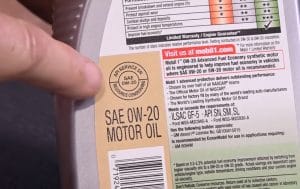
Most Common Oil Types
Conversely, especially old engines may not even have been considered when a particular oil was designed due to their lack of prevalence. The point is, the type of motor oil may not determine how effective the oil is, but you must match them properly for the best results.
Full Synthetic
This is the most common type of motor oil used today, and most newer engines are designed to use full synthetic motor oil. The name is a bit of a misnomer as synthetic oil is still made from petroleum-based products. However, the petroleum products have undergone enough transformations that they are no longer really considered petroleum-like anymore. These materials are incredibly viscous and long-lasting, but they are also significantly more expensive to manufacture. It is also worth remembering that many older engines are not designed to use full synthetic oils, and not all oils have complete backward compatibility.
Premium Conventional
At one time, the “premium” in conventional oil really meant something These days, if an engine takes conventional motor oil, it will be premium conventional motor oil. The defining characteristic of any “conventional” oil is that its base–the 75 to 85-percent non-additives–will be made of petroleum materials. As noted prior, synthetic oils do generally perform better than petroleum-based oils, but some classic and antique engines can only use premium conventional motor oil. It is also worth noting that conventional motor oil is not a poorly performing product and is often less expensive.
Synthetic Blend
As the name suggests, this type of oil blends the conventional and synthetic types. While it may seem like there would be some engine or design-based reason, it actually comes down to simple maths. Basically, synthetic blended oils can offer nearly the same level of performance as full synthetic oils at a significantly lower cost. That said, you should expect that synthetic blends are less likely to perform as well under extreme temperatures. On top of that, they will not last as long as the best full synthetic oils, no matter what additives are included.
High Mileage Oil
Since our list focuses on this particular niche, it is worth exploring what makes a “high mileage oil” in the first place. While the type might seem important, it is actually the additives that generally define a high mileage oil. At the same time, this means that different manufacturers can further specialize within the high mileage niche. But that just turtles all the way down. Instead, consider whether the oil is more of a cleaner, a preserver, or a performer and match to your older engine as appropriate. If your engine is in rough shape, a cleaner and preserver are probably indicated. If your engine is older but still in good condition, you might want to consider a preserver and performer combo.
Viscosity

That said, the main additives which genuinely affect the oils’ viscosity are pour-point depressants and viscosity index improvers. The pour-point depressants are designed to prevent the oil from getting too thick while the viscosity-index improvers are designed to keep it from getting too thin. Keep in mind that anywhere from 15 to 25-percent of all motor oil, regardless of the type, is composed of these additives.
Additives:
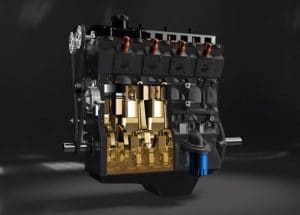
- Cleaning – The two most common type of cleaning additives are detergents and dispersants. Despite the name, detergents are not actually soap, though they do have a similar kind of function. However, they do pull a bit of double-duty in that they also prevent the formation of future deposits as well as cleaning the older ones.Dispersants, on the other hand, are more like a clog remover in that they break up older sludge deposits to either be dissolved into the oil or moved out of the engine. These are often the most common type of additives found in motor oil designed for high mileage engines.
- Preserving – This is another fairly straightforward category with additives that are fairly easy to understand. For instance, the rust-inhibitors do just as their name suggests and prevents the formation of rust or corrosion in your engine. Antiwear agents similarly prevent the wear and tear of metal on metal–even at the microscopic scale.The only one that is not so intuitive is antioxidants as this additive can preserve as well as increase performance. Still, the primary preserving quality antioxidants provide is similar in function to an antiwear additive. Antioxidants can also help prevent the oil from burning too.
- Performance – Considering the function of motor oil, it should not be that surprising that a plurality of the additives used focus on increasing performance. That said, for an area with so much focus, so little is actually told. For instance, viscosity-index improvers are designed to maintain viscosity during hot temperatures. It is pour-point depressants that increase an oil’s performance in cold weather.However, as mentioned earlier, antioxidants help increase fuel-efficiency, but this is only an aftereffect of making sure that the oil does not get too thick under hot temperatures either. Finally, foam inhibitors are a bit of an odd man out in that they focus on a unique problem, but the prevention of foam buildup in the oil, increasing performance and longevity.
Conclusion
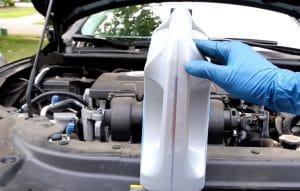
If you do not mind spending a bit more money, the Mobil 1 High Mileage motor oil is easily the best oil for performance that we saw. The fact that it regularly reports 10k mile runs as par for the course is impressive. However, its ability to maintain proper viscosity in even the most punishing of conditions also contributes to its superior performance. Just do not get this with the intention of cleaning out an older engine with years of sludge buildup.
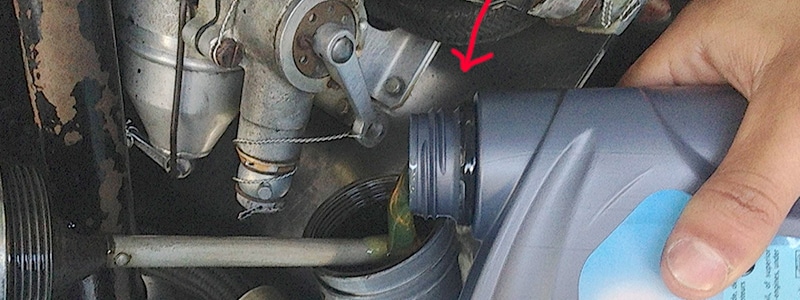

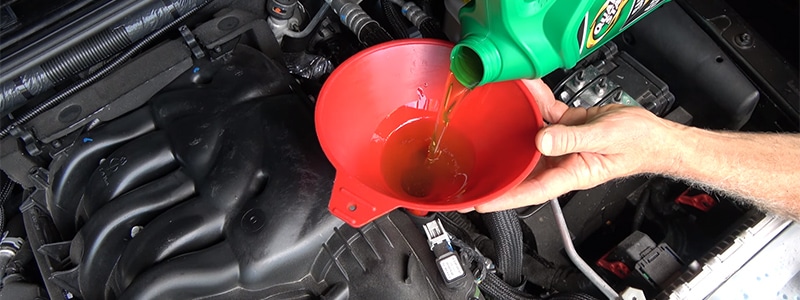
Interestingly enough companies, reviews, and what not talk of oil change intervals going 7-10k but NO ONE mentions to keep your eye on the dip stick in between. My 2018 Elantra 2.0 (manual transmission), will use a quarter of a quart of oil at about 3k. I only use synthetic, change at 5k and use the 5w30 over 5w20. If I let that go 10k without checking, I’d be down a quart for sure. I just hit 80k and the engine has been rock solid. Then again I baby the car like nobodies business.
So if I had a Lesbaru, which consume a quart of oil before leaving the factory, I’d hate to see that dip stick at 10k if never checked.